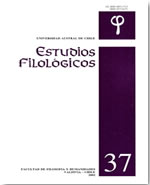The intonation system of colloquial Murcian Spanish. Attitudinal and communicative aspects
Main Article Content
Abstract
The study of the Spanish intonation system has received uneven but increasing attention since Navarro Tomás' publication of his Manual in 1944. Nevertheless, little has been published on the intonational characteristics of the different Spanish accents. Using Jakobson's framework, we try to describe the main intonation features of Murcian Spanish from a purely functional perspective, an accent spoken in Southeastern Spain. Results show that there is a marked tendency towards a narrow pitch range use. The different attitudinal meanings are reflected in the tonal heads, where falling and stepping movements are frequent. It seems to be a typical feature of this accent the recourse to suspensive or slightly ascending or descending tones, particularly in cases where acquiescence or explanations are used with illocutionary force. It is particularly striking, for it goes against standard Spanish practices, the use of a descending low tone in indirect questions as response to a pronominal question of a yes/no type.

